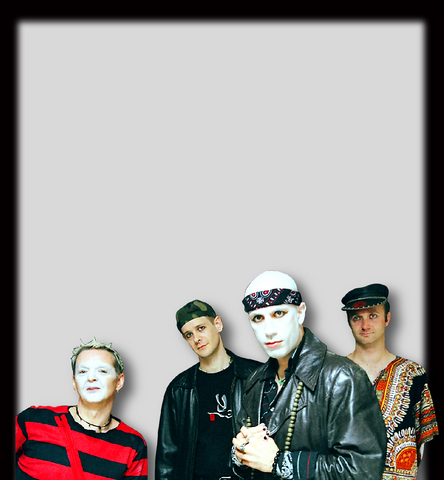If you want to treat yourself to the hardest rockin' band in Taipei, don't miss Sky Burial on Sunday from 9pm to 10pm at the Riverside Cafe.
Named after Tibetan funeral rites, the band is made up of seasoned musicians that hail from Chicago, New York, Maine and the UK.
They describe their music as Goth punk, Western, country, gospel, "Bright, happy stuff, SUV-driving [stuff] Americans listen to.''

Now they plan on "attacking the college crowd in Gongguan,'' according to lead singer Jimmy Vulture (aka Lance Gura).
Sky Burial started out in 2000 with what guitarist Brian Kleinsmith described as a "Hootenanny,'' a rural American jam session of U2, Beatles, old blues tunes.
The band of English teachers soon began writing their own songs, often recording in Kleinsmith's bathroom and laying down tracks with Kleinsmith's Bostex.
Gura and Kleinsmith found a formula: Gura writes lyrics, Kleinsmith works out the melody, and then Paul "Alfie'' Routledge and John Ring lay down drum and bass lines.
"We play roles and it works quite well,'' Routledge said.
Gura added, "It only takes Brian a few minutes to work it all out and to be on the same page. It makes me lick my lips to think of writing 10 more songs. In New York, it could be tedious.''
For the past year, Sky Burial has been perfecting its darkly satirical, hard-hitting punk style at the Living Room. With the help of hairdresser/Web master/drummer Routledge, they've incorporated a "bird of prey'' theme into their act and Web site (www.sky-burial.com), as well as projecting multimedia "eye candy'' behind them as they perform. Their upcoming album, The Freak at the End of the Rainbow, is due early next year.
With classic punk- and rock-inspired, tight riffs by guitarist Kleinsmith and searing lyrics by charismatic lead singer Gura, songs like Ivy and Punishment Fuck will send chills down the spines of even the quietest audience, or at least make them want to get on their feet. As a finale, they do an obscure and loveable Rolling Stones tune, Cocksucker Blues.
As Gura said in an interview. "It's fun to freak out the audience. They strangely don't leave. People are rubberneckers. They see the trainwreck coming and definitely want to check it out.''
Riverside Cafe (

Taiwan has next to no political engagement in Myanmar, either with the ruling military junta nor the dozens of armed groups who’ve in the last five years taken over around two-thirds of the nation’s territory in a sprawling, patchwork civil war. But early last month, the leader of one relatively minor Burmese revolutionary faction, General Nerdah Bomya, who is also an alleged war criminal, made a low key visit to Taipei, where he met with a member of President William Lai’s (賴清德) staff, a retired Taiwanese military official and several academics. “I feel like Taiwan is a good example of

March 2 to March 8 Gunfire rang out along the shore of the frontline island of Lieyu (烈嶼) on a foggy afternoon on March 7, 1987. By the time it was over, about 20 unarmed Vietnamese refugees — men, women, elderly and children — were dead. They were hastily buried, followed by decades of silence. Months later, opposition politicians and journalists tried to uncover what had happened, but conflicting accounts only deepened the confusion. One version suggested that government troops had mistakenly killed their own operatives attempting to return home from Vietnam. The military maintained that the

Jacques Poissant’s suffering stopped the day he asked his daughter if it would be “cowardly to ask to be helped to die.” The retired Canadian insurance adviser was 93, and “was wasting away” after a long battle with prostate cancer. “He no longer had any zest for life,” Josee Poissant said. Last year her mother made the same choice at 96 when she realized she would not be getting out of hospital. She died surrounded by her children and their partners listening to the music she loved. “She was at peace. She sang until she went to sleep.” Josee Poissant remembers it as a beautiful

Before the last section of the round-the-island railway was electrified, one old blue train still chugged back and forth between Pingtung County’s Fangliao (枋寮) and Taitung (台東) stations once a day. It was so slow, was so hot (it had no air conditioning) and covered such a short distance, that the low fare still failed to attract many riders. This relic of the past was finally retired when the South Link Line was fully electrified on Dec. 23, 2020. A wave of nostalgia surrounded the termination of the Ordinary Train service, as these train carriages had been in use for decades